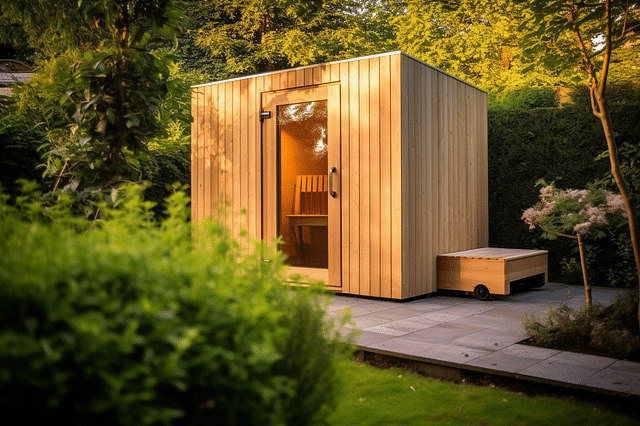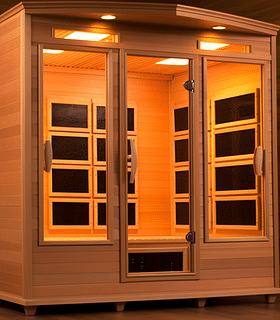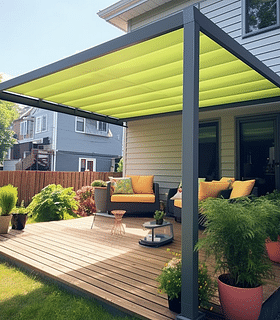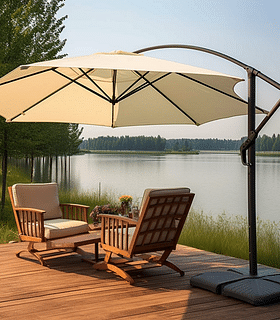Outdoor Sauna vs Indoor Sauna - What's the Difference?
Outdoor Sauna vs Indoor Sauna - Learn the Key Differences and Make an Informed Choice. Discover the benefits and considerations for each option to create your dream sauna experience.

Do you enjoy the relaxing and rejuvenating experience of a sauna? If so, you're not alone! Saunas have been used for centuries as a way to unwind, detoxify, and improve overall well-being.
However, if you're considering investing in a sauna for your home, you may be wondering whether you should go for an outdoor sauna or an indoor sauna. In this blog post, we'll explore the key differences between outdoor and indoor saunas to help you make an informed decision.
Whether you're looking to create a cozy oasis indoors or want to embrace the great outdoors while enjoying the steamy heat, we'll cover all the essential aspects you need to know. So, let's dive in and discover the difference between outdoor saunas and indoor saunas!
What are the benefits of using a sauna?
Let's start by answering the question: what exactly is a sauna? A sauna is a small room or enclosure that is specifically designed to provide heat and steam for relaxation and health benefits. The heat in a sauna typically comes from a stove or heater that heats up rocks, which then radiate heat throughout the room. You can also add water to create steam, which further enhances the experience.
Saunas have been used for centuries in different cultures around the world. They have gained popularity not only for their soothing and relaxing effects but also for the numerous health benefits they provide. Spending time in a sauna can help to improve circulation, detoxify the body, relieve muscle tension, reduce stress, and even promote better sleep. It's like giving yourself a rejuvenating mini-vacation!
The difference between an outdoor sauna and an indoor sauna
Now that we understand the concept and benefits of saunas, let's explore the difference between outdoor saunas and indoor saunas. The main distinction between these two types lies in their location.
An outdoor sauna is typically located outside of the main house or building. It can be a standalone structure or a separate section attached to a larger building, such as a backyard shed or a pool house. Outdoor saunas offer a unique experience as you get to enjoy nature while immersing yourself in the therapeutic heat. They often provide a tranquil and private setting, allowing you to escape from the hustle and bustle of daily life.
On the other hand, an indoor sauna is located within the confines of a house, apartment, or any other building. It can be installed in a dedicated room or even integrated into an existing bathroom. Indoor saunas are convenient for those who prefer quick access to the sauna without having to step outside. They offer privacy and can be easily incorporated into the overall design and layout of your home.
When choosing between an outdoor sauna and an indoor sauna, consider factors such as your personal preference, available space, and budget. Both options offer the same benefits and relaxation, so it ultimately comes down to what suits your lifestyle and needs best.
Now that we've laid the foundation, let's dive deeper into the world of saunas and explore the different types, features, and considerations to help you find your perfect match.
Benefits of an Outdoor Sauna
Saunas have long been known for their numerous health benefits, but have you ever considered the benefits of having an outdoor sauna? In this section, we will explore why an outdoor sauna can be a wonderful addition to your home and lifestyle.
Enhanced connection with nature and relaxation
Picture this: you step outside your back door, breathe in the fresh air, and enter your outdoor sauna nestled in your backyard oasis. The combination of being surrounded by nature and the soothing heat from the sauna creates an unparalleled sense of relaxation and tranquility. The serene ambiance, enhanced by the sounds of birds chirping and leaves rustling, can help you disconnect from the stresses of everyday life and find inner peace.
Health benefits - improved circulation and detoxification
Saunas are well known for their therapeutic benefits, and an outdoor sauna takes these benefits to the next level. The heat generated by the sauna helps to increase blood circulation, promoting healthier skin and improved overall cardiovascular health. Additionally, the sweating induced by the sauna aids in detoxifying the body by flushing out toxins and impurities.
Privacy and personal space
One of the great advantages of having an outdoor sauna is the level of privacy and personal space it provides. Unlike communal saunas found in gyms or spas, an outdoor sauna allows you to enjoy the therapeutic benefits all to yourself or with your close friends and family. This privacy ensures that you can fully unwind and rejuvenate without any distractions.
Customization and design options
When it comes to outdoor saunas, the possibilities are endless. From the size and layout to the materials and design, you have the freedom to customize your sauna to match your personal taste and style. Whether you prefer a rustic wooden sauna or a sleek and modern design, your outdoor sauna can be a reflection of your individuality and enhance the aesthetic appeal of your outdoor space.
In conclusion, an outdoor sauna offers a range of benefits that go beyond the traditional sauna experience. From the enhanced connection with nature and relaxation to the health benefits of improved circulation and detoxification, and the privacy and personal space it provides, an outdoor sauna can truly transform your home into a haven of wellness and tranquility.
Considerations for an Outdoor Sauna
If you're thinking about adding an outdoor sauna to your home, there are a few important factors to consider. These considerations will help ensure that you make the right decisions for your specific needs and preferences. In this section, we will discuss the weather conditions and maintenance, installation and space requirements, and cost considerations associated with having an outdoor sauna.
Weather conditions and maintenance
One of the primary considerations when installing an outdoor sauna is the weather conditions in your area. Saunas are typically designed to withstand a wide range of weather conditions, but it's important to ensure that your sauna is built to withstand the specific climate of your location. For example, if you live in an area that experiences heavy snowfall or high winds, you'll want to choose a sauna that is built with sturdy materials and has a strong foundation.
Additionally, regular maintenance is crucial to keep your outdoor sauna in top condition. This includes cleaning the sauna regularly, checking for any wear and tear, and ensuring that all components are functioning properly. It's also important to consider the long-term costs associated with maintenance, such as replacement parts or repairs. Overall, understanding the weather conditions in your area and being prepared to properly maintain your sauna will help ensure that it remains in great shape for years to come.
Installation and space requirements
Another important consideration for an outdoor sauna is the installation process and the space requirements. Before installing a sauna, it's essential to select a suitable location that meets the necessary safety regulations and building codes. This may involve obtaining permits or consulting with professionals.
In terms of space requirements, you'll need to determine how much space you have available in your yard for the sauna. Consider the size of the sauna you want and ensure that you have enough room for both the sauna itself and the necessary clearances around it. You'll also need to consider factors such as ventilation and accessibility when choosing the location for your outdoor sauna.
Cost considerations
Cost is another crucial factor to consider when planning for an outdoor sauna. The total cost will depend on various factors, including the size and type of sauna, the materials used, and any additional features or customization options. It's important to set a budget and thoroughly research different options to ensure that you choose a sauna that fits your needs and financial constraints.
In addition to the initial cost of purchasing and installing the sauna, it's important to consider the long-term costs associated with owning and maintaining it. This may include regular maintenance and cleaning, energy consumption, and any potential repairs or replacements down the line. By considering these cost factors upfront, you can make an informed decision and avoid any unexpected financial burdens.
Taking the time to carefully consider the weather conditions and maintenance requirements, installation and space considerations, and cost factors associated with an outdoor sauna will help ensure that you make the best choices for your specific needs and preferences. By doing so, you can create a relaxing and enjoyable outdoor sauna experience that adds value to your home and enhances your overall well-being.
Benefits of an Indoor Sauna
Saunas have become increasingly popular in recent years, and for good reason. Not only do they offer relaxation and stress relief, but they also provide several remarkable health benefits. While many people enjoy using saunas at spas or fitness centers, having an indoor sauna in your own home brings even more advantages. In this section, we will explore the various benefits of having an indoor sauna.
Year-round accessibility and convenience
One of the key advantages of having an indoor sauna is the year-round accessibility and convenience it offers. Unlike outdoor saunas, which may be limited by weather conditions and seasonal variations, an indoor sauna allows you to enjoy the benefits of sauna bathing whenever you want. Whether it is a hot summer day or a freezing winter night, you can step into your indoor sauna and experience the soothing heat and therapeutic effects at any time, without any hassle. This convenience and flexibility make an indoor sauna an excellent investment for those seeking a regular and reliable sauna experience.
Privacy and comfort
Privacy is another valuable aspect of having an indoor sauna. While some people enjoy the social atmosphere of public saunas, others prefer the solitude and tranquility found in their own private oasis. With an indoor sauna, you can enjoy the benefits of sauna bathing in the comfort and privacy of your own home. Whether you want to relax alone or invite close friends and family, an indoor sauna provides a personal space where you can unwind, recharge, and enjoy this rejuvenating experience without any interruptions or distractions.
Minimal maintenance and weather independence
Outdoor saunas require regular maintenance to withstand the elements, such as humidity, rain, and snow. On the other hand, indoor saunas have the advantage of minimal maintenance requirements. With proper ventilation and routine cleaning, an indoor sauna can maintain its functionality and appearance with ease. Furthermore, indoor saunas are not affected by weather conditions, enabling you to use your sauna year-round without worrying about external factors. This weather independence ensures a consistent and enjoyable sauna experience, regardless of the climate outside.
Energy efficiency
Energy efficiency is a significant benefit of having an indoor sauna. Compared to outdoor saunas, which require separate heating sources and may consume more energy due to heat loss, indoor saunas are designed to be energy-efficient. They can be integrated with your home's existing heating system, allowing you to utilize the same energy source for both your living space and sauna. This integration ensures reduced energy consumption and lower utility bills, making an indoor sauna an eco-friendly and cost-effective choice.
In summary, an indoor sauna provides numerous advantages that make it an appealing option for sauna enthusiasts. The year-round accessibility and convenience, privacy and comfort, minimal maintenance and weather independence, and energy efficiency are just a few of the benefits that an indoor sauna offers. Whether you are seeking relaxation, health benefits, or a luxurious addition to your home, an indoor sauna is a worthwhile investment that you can enjoy every day.
Considerations for an Indoor Sauna
When considering the installation of an indoor sauna in your home, there are a few important factors to keep in mind. From the available space and ventilation requirements to building permits and regulations, each aspect plays a crucial role in ensuring a successful and enjoyable sauna experience. Additionally, it is also essential to consider the potential impact on your home value and any infrastructural considerations, such as electrical requirements. Let's explore each of these considerations in detail.
Available space and ventilation requirements
Before installing an indoor sauna, it is essential to assess the available space in your home. Saunas come in various sizes and configurations, so it's necessary to choose one that fits comfortably within your intended area. Consider measuring the space to determine the maximum sauna size that can be accommodated.
Ventilation is also a critical consideration for an indoor sauna. Saunas generate heat and moisture, so having proper ventilation is crucial to maintain a comfortable and safe environment. Make sure that the sauna has vents or an exhaust fan to allow for the proper circulation of air. This helps prevent the build-up of excess heat, moisture, and unpleasant odors.
Building permits and regulations
Installing an indoor sauna may require obtaining building permits and adhering to local regulations. These requirements can vary depending on your location, so it's essential to check with your local building department before proceeding with any installation. They will provide you with the necessary information and guidelines to ensure compliance with all building codes and regulations.
Potential impact on home value
Adding an indoor sauna to your home can have an impact on its overall value. While some potential buyers may view a sauna as a desirable feature, others may not find it as appealing. Before investing in an indoor sauna, consider the preferences and market trends in your area. It is always a good idea to consult with a real estate professional to assess the potential impact on your home value.
Infrastructural considerations (e.g., electrical requirements)
When installing an indoor sauna, it is important to consider the necessary infrastructure, particularly electrical requirements. Saunas typically require a dedicated electrical circuit due to the high heat generated. Ensure your electrical system can handle the additional load and consult with a certified electrician for proper installation. This helps avoid any electrical issues or hazards.
Taking into account these considerations will help you make informed decisions and ensure a successful indoor sauna installation. By carefully assessing available space, complying with building permits and regulations, considering the potential impact on home value, and addressing infrastructural considerations, you can create a comfortable and enjoyable sauna experience in the comfort of your own home.
Conclusion
Now that we have explored the key differences between outdoor and indoor saunas, as well as the factors to consider when making a decision, it's time to choose the sauna that suits your lifestyle and preferences.
In summary, outdoor saunas provide a unique and natural experience, allowing you to enjoy the beauty of nature while basking in the sauna heat. On the other hand, indoor saunas offer convenience and privacy, making them a popular choice for those who prefer a more controlled environment.
When making your decision, consider factors such as space availability, budget, installation requirements, and maintenance. Think about how often you plan to use the sauna and who will be using it with you. Additionally, consider your personal preferences for aesthetics and functionality.
By taking all of these factors into account, you can confidently choose the sauna that aligns with your lifestyle, enhances your well-being, and brings you joy for years to come. Remember, both outdoor and indoor saunas offer their own unique benefits, so choose the one that resonates with you and creates the ideal sauna experience.
Trending products
Shop outdoor accessoriesFrequently asked questions
- What are the key differences between an outdoor sauna and an indoor sauna?
- The main difference between an outdoor sauna and an indoor sauna is their location. An outdoor sauna is typically built outside, while an indoor sauna is installed indoors within a dedicated space.
- What are the benefits of an outdoor sauna?
- An outdoor sauna offers a unique and tranquil sauna experience. It allows you to enjoy nature and scenery while you relax and detoxify in the sauna. Additionally, outdoor saunas can provide a more spacious and customizable sauna experience.
- What are the benefits of an indoor sauna?
- Indoor saunas are highly convenient, especially during the colder months. You can easily access your sauna without having to go outside, and they can be integrated into your home's design. Indoor saunas also provide privacy and can be enjoyed year-round.
- Are there any specific considerations for installing an outdoor sauna?
- Yes, when installing an outdoor sauna, you need to consider factors like proper insulation, suitable flooring, and protection from the elements. You may also need to think about privacy and landscaping aspects to create a comfortable and inviting sauna environment.
- Are there any specific considerations for installing an indoor sauna?
- When installing an indoor sauna, it's essential to ensure adequate ventilation and moisture control to prevent any damage to the surrounding areas. You may need to consult with a professional to determine the best location for your indoor sauna and address any structural or electrical requirements.
- Can I use an outdoor sauna during all seasons?
- Yes, you can use an outdoor sauna throughout the year, but you may need to take some extra precautions during extreme weather conditions. Proper insulation, heating elements, and weatherproofing can help ensure that your outdoor sauna remains functional and comfortable in any season.
- Can I use an indoor sauna year-round?
- Absolutely! Indoor saunas can be used year-round without any weather-related concerns. You can enjoy the relaxing benefits of sauna therapy regardless of the season, making it a more convenient option for many individuals.
- Which type of sauna is easier to maintain, outdoor or indoor?
- Maintaining an indoor sauna is generally easier as it is protected from outdoor elements. However, both outdoor and indoor saunas require regular cleaning, proper ventilation, and occasional maintenance to keep them in optimal condition.
- Can I customize an outdoor sauna more than an indoor sauna?
- Yes, outdoor saunas often provide more flexibility for customization. You can choose various materials, designs, and sizes to create your dream outdoor sauna. Additionally, you can incorporate landscaping elements and outdoor seating areas to enhance the overall sauna experience.
- Which type of sauna is more cost-effective, outdoor or indoor?
- The cost-effectiveness of an outdoor sauna versus an indoor sauna can differ depending on various factors such as existing infrastructure, location, and personal preferences. Generally, indoor saunas tend to have lower installation costs since they are integrated into existing structures, while outdoor saunas may require additional construction or landscaping expenses.
Are you looking for more ideas?
Have a look at these other guides about improving your garden and patio to create your dream outdoor space!

Are you looking for more ideas?
-
- Role
- Eco-Friendly Outdoor Living Ideas: How to Create Sustainable Spaces
- Description
- Learn how to make your outdoor space more environmentally friendly with sustainable materials, water-saving landscaping ideas, and more.
-
- Role
- Boost Your Curb Appeal: Front Yard Landscaping Ideas
- Description
- Elevate your home's exterior with these front yard landscaping ideas. From lush greenery to stylish walkways, create a lasting first impression.
-
- Role
- Creating a Kid-Friendly Outdoor Space
- Description
- Ideas and advice on how to create a safe and enjoyable outdoor space for children, from selecting the right play equipment to child-friendly gardening tips.
-
- Role
- Designing an Outdoor Kitchen for Alfresco Dining
- Description
- A comprehensive guide to designing your dream outdoor kitchen, perfect for hosting summer barbecues and enjoying alfresco dining with family and friends.



